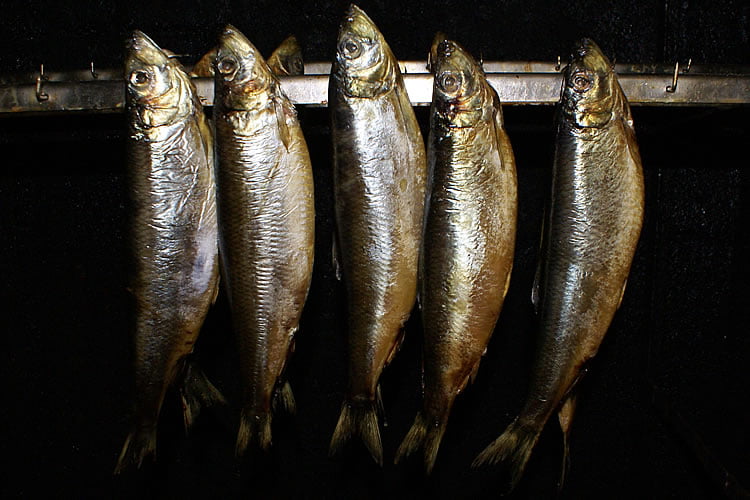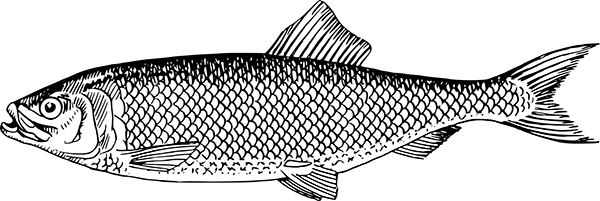On the original bloater, which may have evolved in the C17th, and the Yarmouth bloater, which was first produced there in 1835
BLOATER
During the year January 1st, 1913, to December 31st, 1913 … I ate 161 herrings in one form or another, but, being a Norwich man, principally as bloaters. The Herring; Its Effect on the History of Britain, AM Samuel (1918)
There is the original bloater and there is the bloater in its contemporary form. Samuel writes of the second kind.
Original
This is similar to and at times synonymous with the red herring, cold smoked, whole and ungutted. As a distinct product it was, however, less heavily smoked and more heavily salted: a product of great durability. In the West Indies, where along with both red and white herring, it provided cheap food for slaves, the term seems to be interchangeable with red herring. The Scottish bloater is generally cured in this way and it is from this product that bloater paste is made.
The word itself derives from the Swedish blöta: ‘soaked’ or ‘steeped’ (as in brine, prior to smoking). Some suggest that it describes their plump appearance and a close relative from Normandy is called bouffi (swollen or bloated), but this may have derived from a literal translation of the English.
Records show them to have been an export of Yarmouth since around 1600, although they don’t appear in Thomas Nashe’s Lenten Stuffe (1599) and he would certainly have made play with the word given the opportunity. This may imply that they were an innovation around this time.
In his discovery play The Island Princess (1619), John Fletcher has the line, I have more smoke in my mouth than would blote a hundred herrings. In Masque of Augures (1621), Ben Jonson has, Why you stinke like so many bloat herrings newly taken out of the chimney.
Yarmouth Bloater

Mostly, what is referred to as a bloater or a Yarmouth bloater today is a different beast altogether. The rapid development of the railway system from 1830 onwards allowed food to be transported in bulk, quickly. In the heady excitement of the times, freed from the salty requirements of longevity, herring curers developed new, milder products to tempt the appetites of a nation. The kipper also appeared at this time.
A Mr Bishop produced the first bloaters of the modern era in 1835. It was, quite possibly, the first of the mild cold smoke cures offered to the world at large. He was clearly a man of vision, however, as the railways didn’t come to Great Yarmouth until 1844.
Originally, these bloaters just made do with the salt ‘rousing’ that was done in the well of the Drifter, but when this was replaced by the use of ice the curers took to keeping the herrings in salt overnight, for between twelve and eighteen hours. They are then given a mild smoking in the same ovens that were used for the red herring, but with billets of hard wood used to produce more flame and heat and less of a dense smoke.
AM Samuel writes:
The Yarmouth bloater is an ungutted, unsplit herring one-third fresh, one-third slightly salt, and one-third lightly smoked, and, to my taste, is of the right delicacy and quality only in and near Great Yarmouth; bloaters procured anywhere else than in that town or its near neighbourhood, lacking to my mind, the peculiar excellence of the fish eaten there. Since, however, the fish begins to deteriorate rapidly in condition and flavour within five days of being taken from the sea, it is obvious that the bloater is not the most economical, though in perfection it is the most delicious, method of preparing the herring.
Leaving the fish ungutted gives the bloater a pleasantly gamey taste. The silvery skins only slightly stained with smoke, they travel a bit better, these days, with refrigeration. The East Anglian herring season that supplied the original, less fatty, ‘bloatering’ fish collapsed in the 1970s, but similar herrings are caught off North East Scotland, Iceland and Norway.
HS Fishing in Great Yarmouth, which used to produce them, along with red herring and other products, closed in 2018. A strictly Yarmouth bloater may not exist anymore. AM Samuel may be turning in his grave. Pinneys of Orford and the Cley Smokehouse still produce beautiful bloaters and there will be other versions available on the East Anglian coast. They are worth seeking out.
